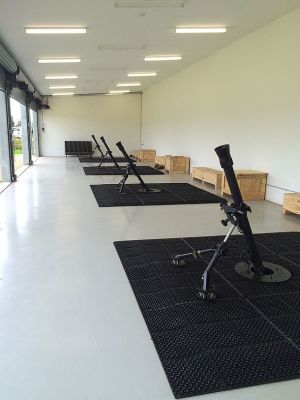A Defence scientist who has exploited the science of sound to pinpoint military threats underwater and over land has won the 2016 Minister’s Award for Achievement in Defence Science. In related news, a Defence project team has won a prestigious project management award for the enhancement of weapons training systems across the country.
Minister for Defence Senator Marise Payne congratulated Dr Brian Ferguson from the DST Group for his world-leading research in acoustics and signal processing which has contributed significantly to Defence capability by detecting, classifying and tracking targets of military interest.
“Dr Ferguson has broken new ground with his innovative research into advanced acoustic technologies which are being used in Australian and US operational systems for improved situational awareness and surveillance,” Minister Payne said.
Dr Ferguson’s extensive studies established a direct connection between acoustic signals and the course, speed and identity of ships, submarines, aircraft and even speeding bullets.
“An acoustic system based on Dr Ferguson’s studies accurately geo-located mortar fire from insurgents during Operation Iraqi Freedom and saved the lives of coalition forces and innocent civilians,” Minister Payne said.
Dr Ferguson developed new data processing techniques which have enabled Navy’s sonar operators to identify targets at significantly greater distances than before and allowed submerged submarines to track aircraft flying overhead. His research has also improved safety in Navy’s mine hunting operations by delivering acoustic imagery for examining mine-like objects from safe distances.
His work has resulted in enhancements to sonar technologies that are now incorporated in Australian and US submarines.
Dr Ferguson was the first researcher to develop land-based acoustic systems with low false alarm rates for remote unattended surveillance, resulting in these systems being developed for use in conflict zones by the Australian and US armies.
“Thanks to Dr Ferguson’s innovative research, our submarines have significantly improved their detection capability over increased distances, our ports and harbours are better protected against threats and even the ecologically sensitive Great Barrier Reef benefits from a higher level of protection against intrusions from commercial shipping,” Minister Payne said.
The annual Minister’s Award for Achievement in Defence Science recognises original and outstanding contributions capable of enhancing Australia’s defence effectiveness and efficiency.
The Australian Institute of Project Management national award in the Defence/Aerospace category was awarded to the AMP029.44 project team within the Land Systems Division (LSD) of Defence’s CASG for the introduction of four new simulated weapon systems.
The Weapon Training Simulation System (WTSS) is a virtual weapons range designed to allow ADF personnel to practice weapon handling drills, marksmanship and fire control orders.
Meggitt Training Systems Australia (MTSA) and the LSD project team worked collaboratively to overcome numerous issues around scope and schedule, as well as several software and hardware challenges.
 MTSA recently signed a $42.7 million (excluding GST) service support contract extension with Defence for WTSS, the Indirect Fire Trainer (IFT) and Indirect Fire-Forward Air Control Trainer (I-FACT).
MTSA recently signed a $42.7 million (excluding GST) service support contract extension with Defence for WTSS, the Indirect Fire Trainer (IFT) and Indirect Fire-Forward Air Control Trainer (I-FACT).
Based in Albury, NSW, MTSA is responsible for the operation and maintenance of WTSS units at 18 regional locations throughout Australia, maintenance of fixed IFT systems at the School of Artillery Puckapunyal, Victoria, and support for mobile IFT and I-FACT systems at various regular and reserve units, including special forces units, throughout Australia.




